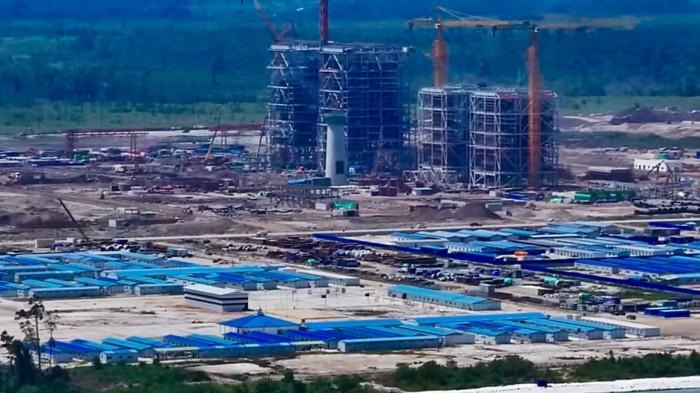News
North Kalimantan economy to grow by 4.5-5 percent yoy in 2025
WINDONESIA September 16, 2025 Construction of KIPI in Bulungan Regency, North Kalimantan. (PT KIPI)
Construction of KIPI in Bulungan Regency, North Kalimantan. (PT KIPI)
Bank Indonesia (BI) North Kalimantan Representative Office Head Hasiando Ginsar Manik stated during the official release for North Kalimantan Provincial Economic Report for August 2025 that the province's economy is projected to continue growing at a higher rate in 2025 compared to last year.
He explained that the economic growth projection for North Kalimantan to grow in the 4.5–5 percent year-on-year (yoy) range is primarily supported by the performance of the manufacturing, trade, and construction sectors.
"The manufacturing sector is expected to play a significant role in [North Kalimantan's] GDP (gross domestic product) 2025, in line with the investment realization and production of the paper factory in Tarakan, the increase in CPO (crude palm oil) production targets by several palm oil companies, and the targeted commissioning of the aluminum smelter in Bulungan in the fourth quarter (Q4) of 2025," Hasiando explained.
The construction sector is projected to continue growing in line with ongoing National Strategic Projects (PSNs), such as the development of the Kalimantan Industrial Park Indonesia (KIPI) managed by PT KIPI in Bulungan Regency, and the Sei Mentarang Hydropower Plant (HPP) in Malinau Regency.
Hasiando also stated that the trade sector is expected to continue to grow in line with North Kalimantan's economic activity and development. BI further outlined that positive growth also occurred in the trade sector.
"This is supported by consumer optimism, domestic trade, and the acceleration of strategic projects," he explained.
The agriculture, forestry, and fisheries sector, he noted, saw a slight increase thanks to rising oil palm fresh fruit bunches (FFB) prices, the expansion of Indonesian Planting Movement (GERINA) rice fields, as well as optimism for fisheries and seaweed commodities.
"For the mining sector, growth in 2025 will be limited due to declining global demand and unfavorable weather," Hasiando said.
On the demand side, household consumption was predicted to remain positive throughout 2025, driven by increases in the provincial and city/regency minimum wages as well as public optimism. Similarly, BI also expected government expenditure to continue growing, albeit at a slower pace due to the state and regional budget austerity policy.
"Investment continues to grow along with the construction of KIPI and the [Sei Mentarang] HPP, although several infrastructure projects have been postponed," he said.
External and internal factors are cited as hindering growth. Those external factors include the economic slowdown in China and India, which has reduced export demand. The Russo-Ukrainian War, the Gaza Genocide and related wars in the Middle East, and the 2025 Indo-Pakistani conflict are also significant disruptions. Other external factors include the uncertainty of trade tariff wars and the global energy transition to renewable energy.
Internally, bad weather is impacting agriculture, fisheries, and mining, while the restive political situation is also significantly depressing investment.
"Finally, delays in government spending or strategic development are also contributing to slowing economic growth," he added.

